Critical Reflection: Hong Kong ECEC Policy and Free Education
VerifiedAdded on 2021/06/18
|9
|2374
|291
Essay
AI Summary
This critical reflection paper examines the Hong Kong Early Childhood Education and Care (ECEC) policy, focusing on free education initiatives. The author reflects on their learning from a module on policy issues in early childhood, particularly the development of the ECEC policy, its trends, and related challenges. The analysis applies theories such as Foucault's concept of power, the social construction of childhood, and child rights perspectives to assess the policy's impact on quality, marketing, and globalization. The paper explores the implications of the Pre-primary Education Voucher Scheme (PEVS) and discusses the need for a comprehensive approach to free kindergarten education. The reflection also considers the policy's influence on the author's professional development as an educator and its potential to shape their future practice. The author utilizes Brookfield's four lenses of reflection—autobiographical, colleagues' experiences, students' perspectives, and theoretical literature—to support the arguments and provide a well-rounded analysis of the policy's strengths and weaknesses. The author concludes that understanding the implications of policies such as the free kindergarten education would be crucial in their future practice.
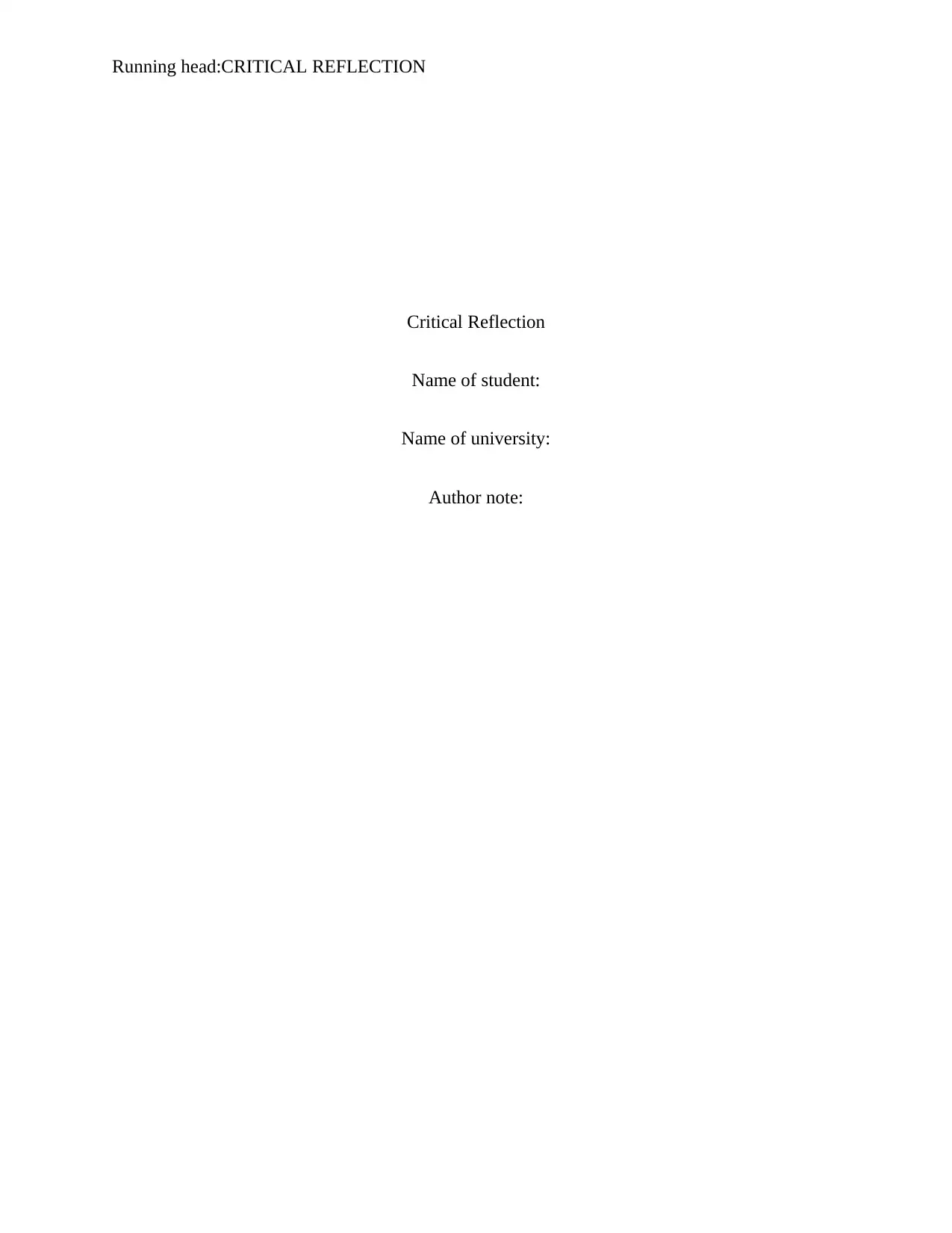
Running head:CRITICAL REFLECTION
Critical Reflection
Name of student:
Name of university:
Author note:
Critical Reflection
Name of student:
Name of university:
Author note:
Paraphrase This Document
Need a fresh take? Get an instant paraphrase of this document with our AI Paraphraser
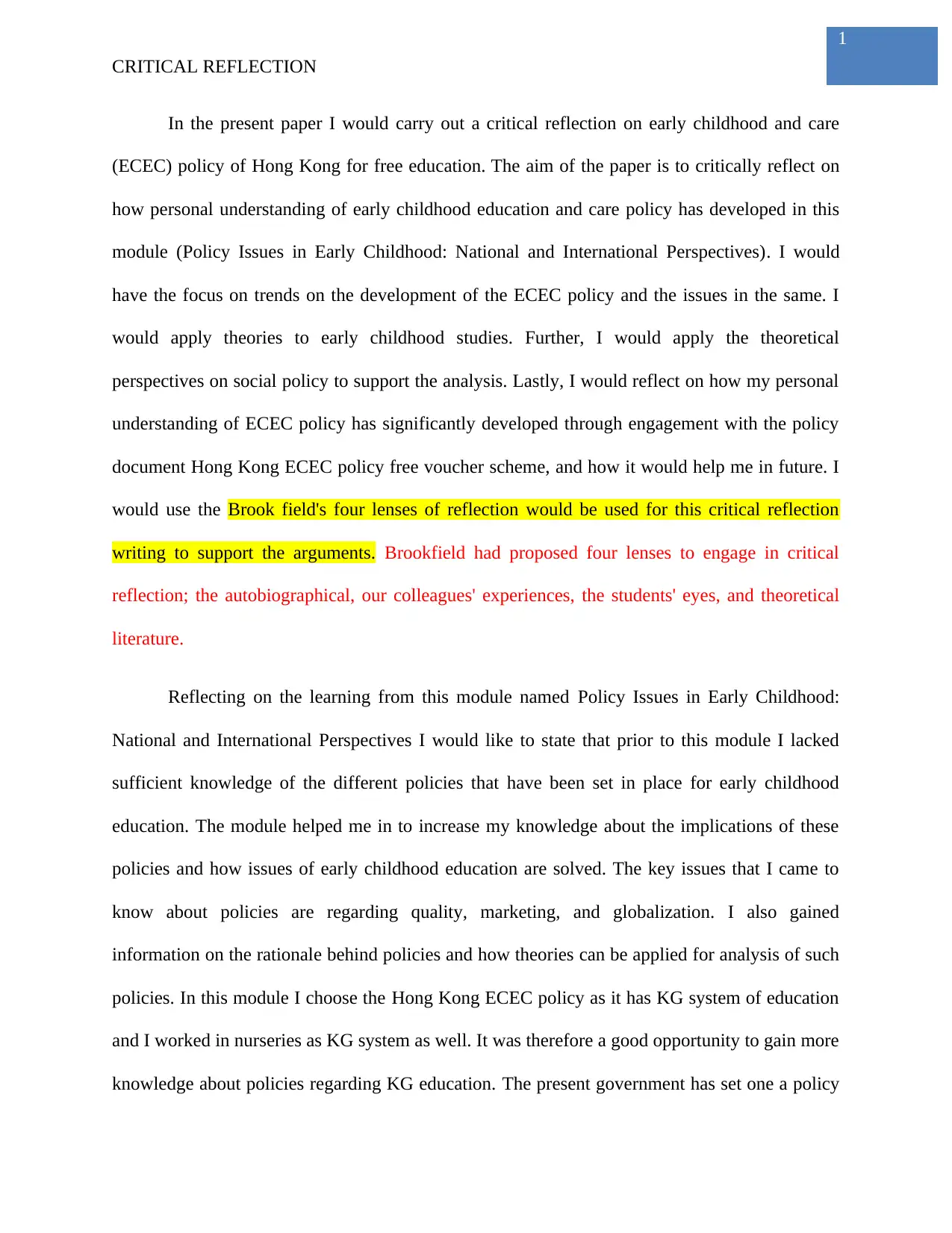
1
CRITICAL REFLECTION
In the present paper I would carry out a critical reflection on early childhood and care
(ECEC) policy of Hong Kong for free education. The aim of the paper is to critically reflect on
how personal understanding of early childhood education and care policy has developed in this
module (Policy Issues in Early Childhood: National and International Perspectives). I would
have the focus on trends on the development of the ECEC policy and the issues in the same. I
would apply theories to early childhood studies. Further, I would apply the theoretical
perspectives on social policy to support the analysis. Lastly, I would reflect on how my personal
understanding of ECEC policy has significantly developed through engagement with the policy
document Hong Kong ECEC policy free voucher scheme, and how it would help me in future. I
would use the Brook field's four lenses of reflection would be used for this critical reflection
writing to support the arguments. Brookfield had proposed four lenses to engage in critical
reflection; the autobiographical, our colleagues' experiences, the students' eyes, and theoretical
literature.
Reflecting on the learning from this module named Policy Issues in Early Childhood:
National and International Perspectives I would like to state that prior to this module I lacked
sufficient knowledge of the different policies that have been set in place for early childhood
education. The module helped me in to increase my knowledge about the implications of these
policies and how issues of early childhood education are solved. The key issues that I came to
know about policies are regarding quality, marketing, and globalization. I also gained
information on the rationale behind policies and how theories can be applied for analysis of such
policies. In this module I choose the Hong Kong ECEC policy as it has KG system of education
and I worked in nurseries as KG system as well. It was therefore a good opportunity to gain more
knowledge about policies regarding KG education. The present government has set one a policy
CRITICAL REFLECTION
In the present paper I would carry out a critical reflection on early childhood and care
(ECEC) policy of Hong Kong for free education. The aim of the paper is to critically reflect on
how personal understanding of early childhood education and care policy has developed in this
module (Policy Issues in Early Childhood: National and International Perspectives). I would
have the focus on trends on the development of the ECEC policy and the issues in the same. I
would apply theories to early childhood studies. Further, I would apply the theoretical
perspectives on social policy to support the analysis. Lastly, I would reflect on how my personal
understanding of ECEC policy has significantly developed through engagement with the policy
document Hong Kong ECEC policy free voucher scheme, and how it would help me in future. I
would use the Brook field's four lenses of reflection would be used for this critical reflection
writing to support the arguments. Brookfield had proposed four lenses to engage in critical
reflection; the autobiographical, our colleagues' experiences, the students' eyes, and theoretical
literature.
Reflecting on the learning from this module named Policy Issues in Early Childhood:
National and International Perspectives I would like to state that prior to this module I lacked
sufficient knowledge of the different policies that have been set in place for early childhood
education. The module helped me in to increase my knowledge about the implications of these
policies and how issues of early childhood education are solved. The key issues that I came to
know about policies are regarding quality, marketing, and globalization. I also gained
information on the rationale behind policies and how theories can be applied for analysis of such
policies. In this module I choose the Hong Kong ECEC policy as it has KG system of education
and I worked in nurseries as KG system as well. It was therefore a good opportunity to gain more
knowledge about policies regarding KG education. The present government has set one a policy
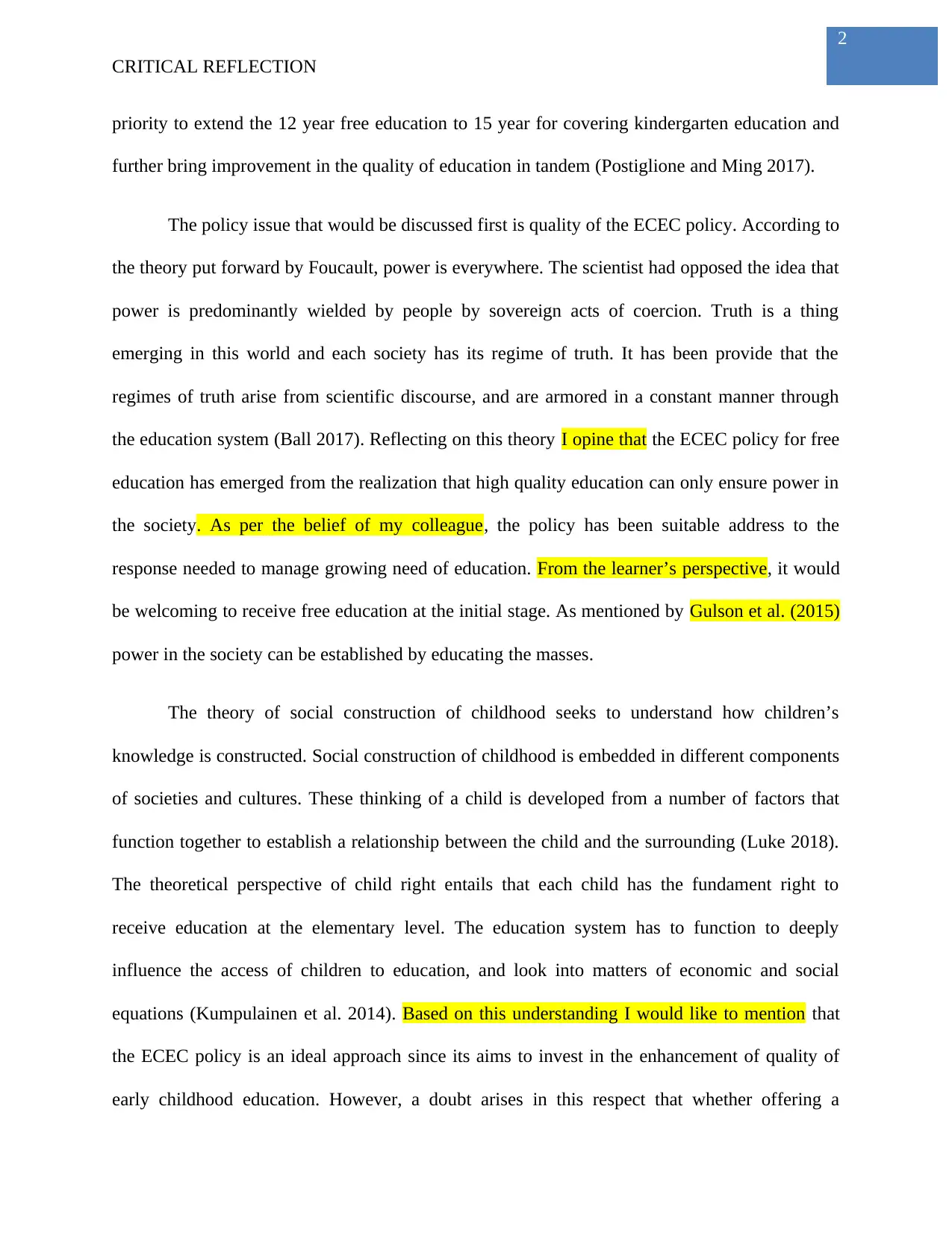
2
CRITICAL REFLECTION
priority to extend the 12 year free education to 15 year for covering kindergarten education and
further bring improvement in the quality of education in tandem (Postiglione and Ming 2017).
The policy issue that would be discussed first is quality of the ECEC policy. According to
the theory put forward by Foucault, power is everywhere. The scientist had opposed the idea that
power is predominantly wielded by people by sovereign acts of coercion. Truth is a thing
emerging in this world and each society has its regime of truth. It has been provide that the
regimes of truth arise from scientific discourse, and are armored in a constant manner through
the education system (Ball 2017). Reflecting on this theory I opine that the ECEC policy for free
education has emerged from the realization that high quality education can only ensure power in
the society. As per the belief of my colleague, the policy has been suitable address to the
response needed to manage growing need of education. From the learner’s perspective, it would
be welcoming to receive free education at the initial stage. As mentioned by Gulson et al. (2015)
power in the society can be established by educating the masses.
The theory of social construction of childhood seeks to understand how children’s
knowledge is constructed. Social construction of childhood is embedded in different components
of societies and cultures. These thinking of a child is developed from a number of factors that
function together to establish a relationship between the child and the surrounding (Luke 2018).
The theoretical perspective of child right entails that each child has the fundament right to
receive education at the elementary level. The education system has to function to deeply
influence the access of children to education, and look into matters of economic and social
equations (Kumpulainen et al. 2014). Based on this understanding I would like to mention that
the ECEC policy is an ideal approach since its aims to invest in the enhancement of quality of
early childhood education. However, a doubt arises in this respect that whether offering a
CRITICAL REFLECTION
priority to extend the 12 year free education to 15 year for covering kindergarten education and
further bring improvement in the quality of education in tandem (Postiglione and Ming 2017).
The policy issue that would be discussed first is quality of the ECEC policy. According to
the theory put forward by Foucault, power is everywhere. The scientist had opposed the idea that
power is predominantly wielded by people by sovereign acts of coercion. Truth is a thing
emerging in this world and each society has its regime of truth. It has been provide that the
regimes of truth arise from scientific discourse, and are armored in a constant manner through
the education system (Ball 2017). Reflecting on this theory I opine that the ECEC policy for free
education has emerged from the realization that high quality education can only ensure power in
the society. As per the belief of my colleague, the policy has been suitable address to the
response needed to manage growing need of education. From the learner’s perspective, it would
be welcoming to receive free education at the initial stage. As mentioned by Gulson et al. (2015)
power in the society can be established by educating the masses.
The theory of social construction of childhood seeks to understand how children’s
knowledge is constructed. Social construction of childhood is embedded in different components
of societies and cultures. These thinking of a child is developed from a number of factors that
function together to establish a relationship between the child and the surrounding (Luke 2018).
The theoretical perspective of child right entails that each child has the fundament right to
receive education at the elementary level. The education system has to function to deeply
influence the access of children to education, and look into matters of economic and social
equations (Kumpulainen et al. 2014). Based on this understanding I would like to mention that
the ECEC policy is an ideal approach since its aims to invest in the enhancement of quality of
early childhood education. However, a doubt arises in this respect that whether offering a
⊘ This is a preview!⊘
Do you want full access?
Subscribe today to unlock all pages.

Trusted by 1+ million students worldwide
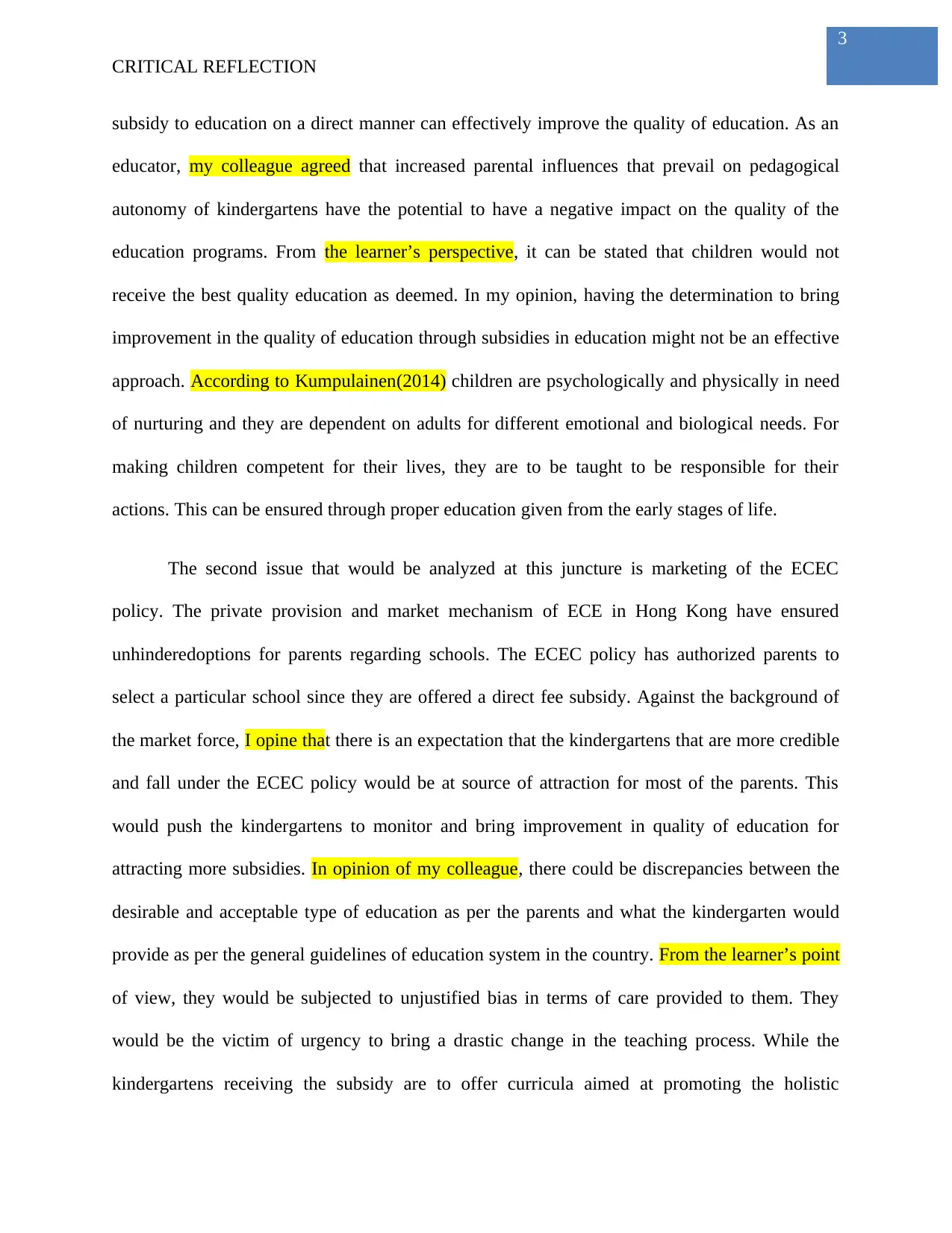
3
CRITICAL REFLECTION
subsidy to education on a direct manner can effectively improve the quality of education. As an
educator, my colleague agreed that increased parental influences that prevail on pedagogical
autonomy of kindergartens have the potential to have a negative impact on the quality of the
education programs. From the learner’s perspective, it can be stated that children would not
receive the best quality education as deemed. In my opinion, having the determination to bring
improvement in the quality of education through subsidies in education might not be an effective
approach. According to Kumpulainen(2014) children are psychologically and physically in need
of nurturing and they are dependent on adults for different emotional and biological needs. For
making children competent for their lives, they are to be taught to be responsible for their
actions. This can be ensured through proper education given from the early stages of life.
The second issue that would be analyzed at this juncture is marketing of the ECEC
policy. The private provision and market mechanism of ECE in Hong Kong have ensured
unhinderedoptions for parents regarding schools. The ECEC policy has authorized parents to
select a particular school since they are offered a direct fee subsidy. Against the background of
the market force, I opine that there is an expectation that the kindergartens that are more credible
and fall under the ECEC policy would be at source of attraction for most of the parents. This
would push the kindergartens to monitor and bring improvement in quality of education for
attracting more subsidies. In opinion of my colleague, there could be discrepancies between the
desirable and acceptable type of education as per the parents and what the kindergarten would
provide as per the general guidelines of education system in the country. From the learner’s point
of view, they would be subjected to unjustified bias in terms of care provided to them. They
would be the victim of urgency to bring a drastic change in the teaching process. While the
kindergartens receiving the subsidy are to offer curricula aimed at promoting the holistic
CRITICAL REFLECTION
subsidy to education on a direct manner can effectively improve the quality of education. As an
educator, my colleague agreed that increased parental influences that prevail on pedagogical
autonomy of kindergartens have the potential to have a negative impact on the quality of the
education programs. From the learner’s perspective, it can be stated that children would not
receive the best quality education as deemed. In my opinion, having the determination to bring
improvement in the quality of education through subsidies in education might not be an effective
approach. According to Kumpulainen(2014) children are psychologically and physically in need
of nurturing and they are dependent on adults for different emotional and biological needs. For
making children competent for their lives, they are to be taught to be responsible for their
actions. This can be ensured through proper education given from the early stages of life.
The second issue that would be analyzed at this juncture is marketing of the ECEC
policy. The private provision and market mechanism of ECE in Hong Kong have ensured
unhinderedoptions for parents regarding schools. The ECEC policy has authorized parents to
select a particular school since they are offered a direct fee subsidy. Against the background of
the market force, I opine that there is an expectation that the kindergartens that are more credible
and fall under the ECEC policy would be at source of attraction for most of the parents. This
would push the kindergartens to monitor and bring improvement in quality of education for
attracting more subsidies. In opinion of my colleague, there could be discrepancies between the
desirable and acceptable type of education as per the parents and what the kindergarten would
provide as per the general guidelines of education system in the country. From the learner’s point
of view, they would be subjected to unjustified bias in terms of care provided to them. They
would be the victim of urgency to bring a drastic change in the teaching process. While the
kindergartens receiving the subsidy are to offer curricula aimed at promoting the holistic
Paraphrase This Document
Need a fresh take? Get an instant paraphrase of this document with our AI Paraphraser
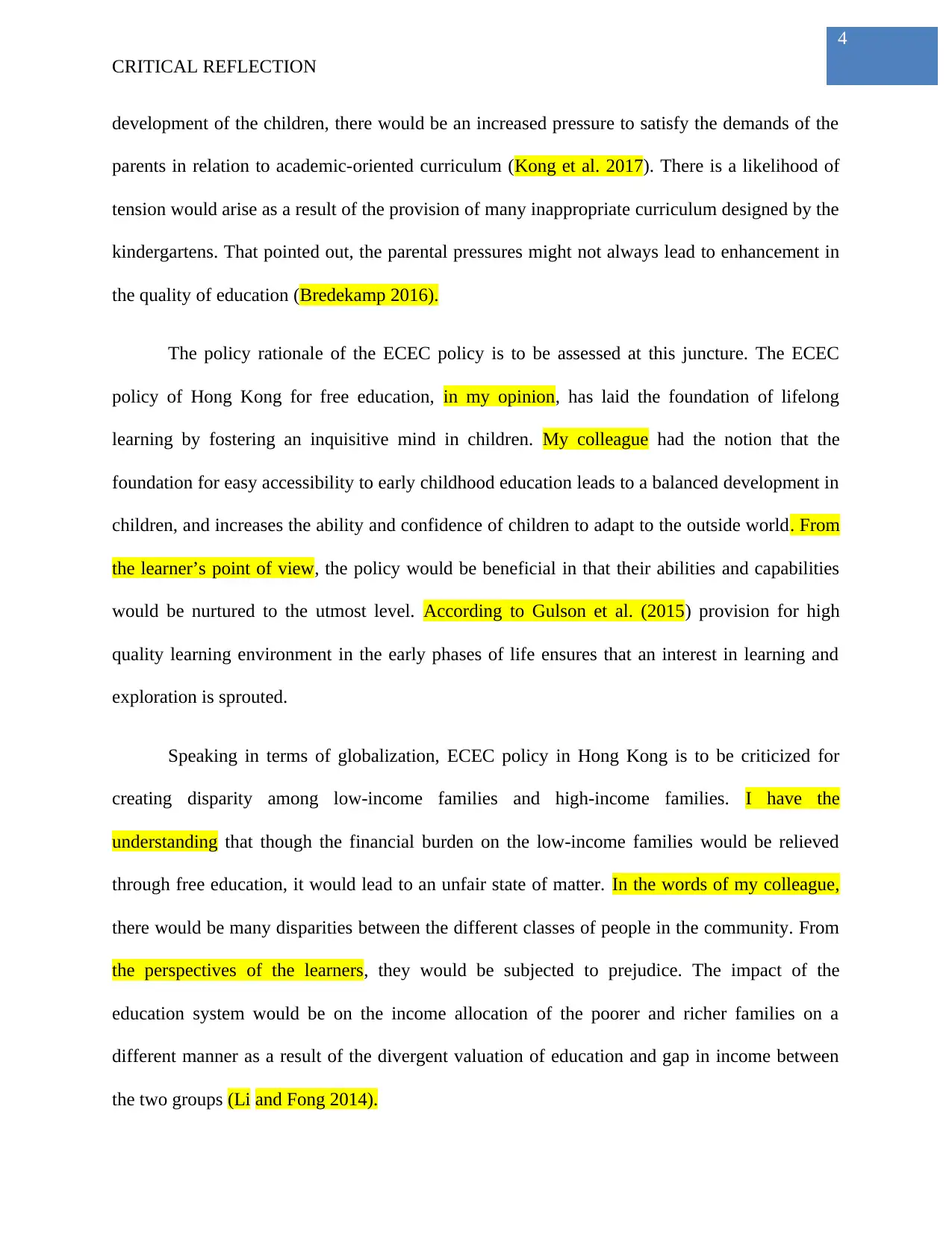
4
CRITICAL REFLECTION
development of the children, there would be an increased pressure to satisfy the demands of the
parents in relation to academic-oriented curriculum (Kong et al. 2017). There is a likelihood of
tension would arise as a result of the provision of many inappropriate curriculum designed by the
kindergartens. That pointed out, the parental pressures might not always lead to enhancement in
the quality of education (Bredekamp 2016).
The policy rationale of the ECEC policy is to be assessed at this juncture. The ECEC
policy of Hong Kong for free education, in my opinion, has laid the foundation of lifelong
learning by fostering an inquisitive mind in children. My colleague had the notion that the
foundation for easy accessibility to early childhood education leads to a balanced development in
children, and increases the ability and confidence of children to adapt to the outside world. From
the learner’s point of view, the policy would be beneficial in that their abilities and capabilities
would be nurtured to the utmost level. According to Gulson et al. (2015) provision for high
quality learning environment in the early phases of life ensures that an interest in learning and
exploration is sprouted.
Speaking in terms of globalization, ECEC policy in Hong Kong is to be criticized for
creating disparity among low-income families and high-income families. I have the
understanding that though the financial burden on the low-income families would be relieved
through free education, it would lead to an unfair state of matter. In the words of my colleague,
there would be many disparities between the different classes of people in the community. From
the perspectives of the learners, they would be subjected to prejudice. The impact of the
education system would be on the income allocation of the poorer and richer families on a
different manner as a result of the divergent valuation of education and gap in income between
the two groups (Li and Fong 2014).
CRITICAL REFLECTION
development of the children, there would be an increased pressure to satisfy the demands of the
parents in relation to academic-oriented curriculum (Kong et al. 2017). There is a likelihood of
tension would arise as a result of the provision of many inappropriate curriculum designed by the
kindergartens. That pointed out, the parental pressures might not always lead to enhancement in
the quality of education (Bredekamp 2016).
The policy rationale of the ECEC policy is to be assessed at this juncture. The ECEC
policy of Hong Kong for free education, in my opinion, has laid the foundation of lifelong
learning by fostering an inquisitive mind in children. My colleague had the notion that the
foundation for easy accessibility to early childhood education leads to a balanced development in
children, and increases the ability and confidence of children to adapt to the outside world. From
the learner’s point of view, the policy would be beneficial in that their abilities and capabilities
would be nurtured to the utmost level. According to Gulson et al. (2015) provision for high
quality learning environment in the early phases of life ensures that an interest in learning and
exploration is sprouted.
Speaking in terms of globalization, ECEC policy in Hong Kong is to be criticized for
creating disparity among low-income families and high-income families. I have the
understanding that though the financial burden on the low-income families would be relieved
through free education, it would lead to an unfair state of matter. In the words of my colleague,
there would be many disparities between the different classes of people in the community. From
the perspectives of the learners, they would be subjected to prejudice. The impact of the
education system would be on the income allocation of the poorer and richer families on a
different manner as a result of the divergent valuation of education and gap in income between
the two groups (Li and Fong 2014).
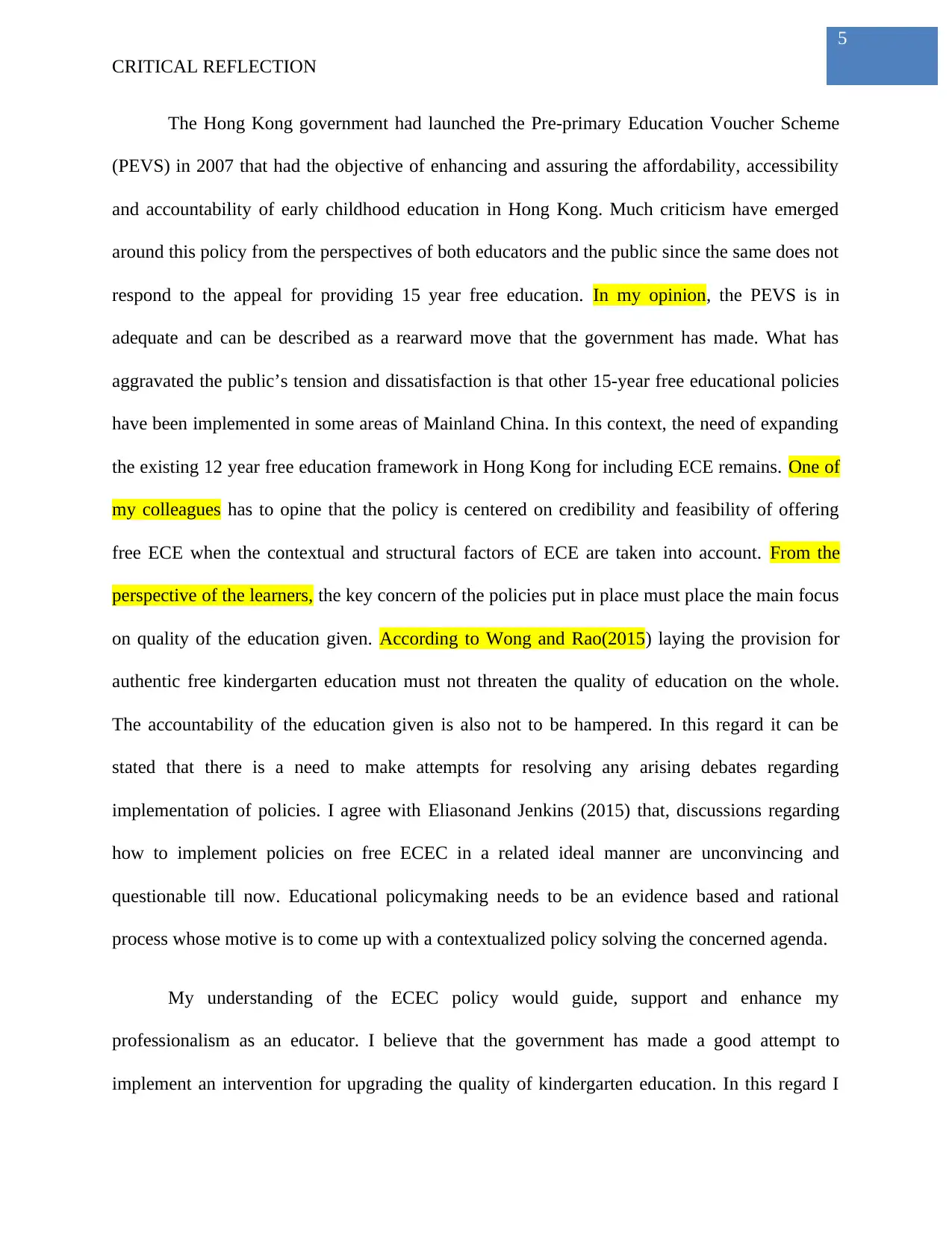
5
CRITICAL REFLECTION
The Hong Kong government had launched the Pre-primary Education Voucher Scheme
(PEVS) in 2007 that had the objective of enhancing and assuring the affordability, accessibility
and accountability of early childhood education in Hong Kong. Much criticism have emerged
around this policy from the perspectives of both educators and the public since the same does not
respond to the appeal for providing 15 year free education. In my opinion, the PEVS is in
adequate and can be described as a rearward move that the government has made. What has
aggravated the public’s tension and dissatisfaction is that other 15-year free educational policies
have been implemented in some areas of Mainland China. In this context, the need of expanding
the existing 12 year free education framework in Hong Kong for including ECE remains. One of
my colleagues has to opine that the policy is centered on credibility and feasibility of offering
free ECE when the contextual and structural factors of ECE are taken into account. From the
perspective of the learners, the key concern of the policies put in place must place the main focus
on quality of the education given. According to Wong and Rao(2015) laying the provision for
authentic free kindergarten education must not threaten the quality of education on the whole.
The accountability of the education given is also not to be hampered. In this regard it can be
stated that there is a need to make attempts for resolving any arising debates regarding
implementation of policies. I agree with Eliasonand Jenkins (2015) that, discussions regarding
how to implement policies on free ECEC in a related ideal manner are unconvincing and
questionable till now. Educational policymaking needs to be an evidence based and rational
process whose motive is to come up with a contextualized policy solving the concerned agenda.
My understanding of the ECEC policy would guide, support and enhance my
professionalism as an educator. I believe that the government has made a good attempt to
implement an intervention for upgrading the quality of kindergarten education. In this regard I
CRITICAL REFLECTION
The Hong Kong government had launched the Pre-primary Education Voucher Scheme
(PEVS) in 2007 that had the objective of enhancing and assuring the affordability, accessibility
and accountability of early childhood education in Hong Kong. Much criticism have emerged
around this policy from the perspectives of both educators and the public since the same does not
respond to the appeal for providing 15 year free education. In my opinion, the PEVS is in
adequate and can be described as a rearward move that the government has made. What has
aggravated the public’s tension and dissatisfaction is that other 15-year free educational policies
have been implemented in some areas of Mainland China. In this context, the need of expanding
the existing 12 year free education framework in Hong Kong for including ECE remains. One of
my colleagues has to opine that the policy is centered on credibility and feasibility of offering
free ECE when the contextual and structural factors of ECE are taken into account. From the
perspective of the learners, the key concern of the policies put in place must place the main focus
on quality of the education given. According to Wong and Rao(2015) laying the provision for
authentic free kindergarten education must not threaten the quality of education on the whole.
The accountability of the education given is also not to be hampered. In this regard it can be
stated that there is a need to make attempts for resolving any arising debates regarding
implementation of policies. I agree with Eliasonand Jenkins (2015) that, discussions regarding
how to implement policies on free ECEC in a related ideal manner are unconvincing and
questionable till now. Educational policymaking needs to be an evidence based and rational
process whose motive is to come up with a contextualized policy solving the concerned agenda.
My understanding of the ECEC policy would guide, support and enhance my
professionalism as an educator. I believe that the government has made a good attempt to
implement an intervention for upgrading the quality of kindergarten education. In this regard I
⊘ This is a preview!⊘
Do you want full access?
Subscribe today to unlock all pages.

Trusted by 1+ million students worldwide
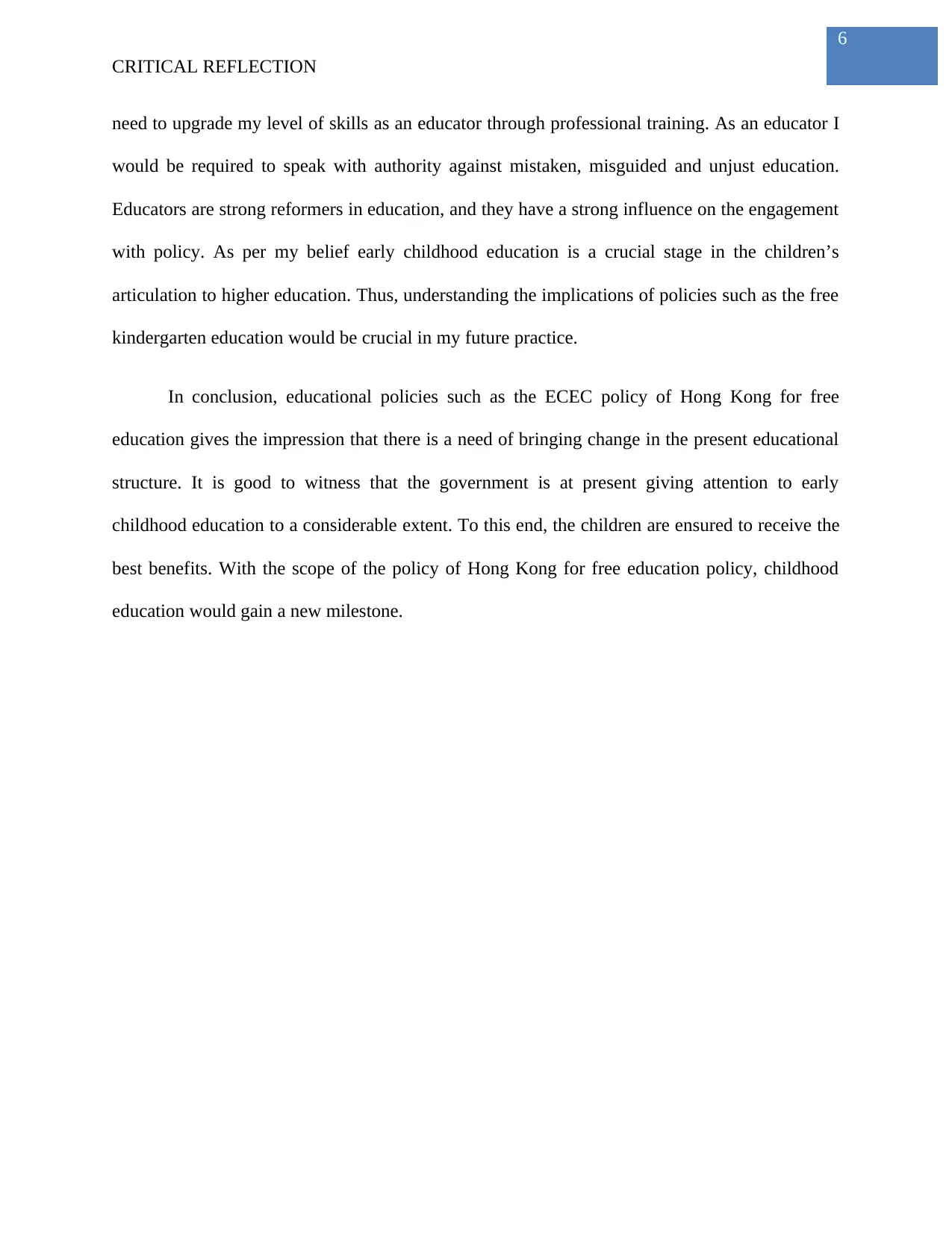
6
CRITICAL REFLECTION
need to upgrade my level of skills as an educator through professional training. As an educator I
would be required to speak with authority against mistaken, misguided and unjust education.
Educators are strong reformers in education, and they have a strong influence on the engagement
with policy. As per my belief early childhood education is a crucial stage in the children’s
articulation to higher education. Thus, understanding the implications of policies such as the free
kindergarten education would be crucial in my future practice.
In conclusion, educational policies such as the ECEC policy of Hong Kong for free
education gives the impression that there is a need of bringing change in the present educational
structure. It is good to witness that the government is at present giving attention to early
childhood education to a considerable extent. To this end, the children are ensured to receive the
best benefits. With the scope of the policy of Hong Kong for free education policy, childhood
education would gain a new milestone.
CRITICAL REFLECTION
need to upgrade my level of skills as an educator through professional training. As an educator I
would be required to speak with authority against mistaken, misguided and unjust education.
Educators are strong reformers in education, and they have a strong influence on the engagement
with policy. As per my belief early childhood education is a crucial stage in the children’s
articulation to higher education. Thus, understanding the implications of policies such as the free
kindergarten education would be crucial in my future practice.
In conclusion, educational policies such as the ECEC policy of Hong Kong for free
education gives the impression that there is a need of bringing change in the present educational
structure. It is good to witness that the government is at present giving attention to early
childhood education to a considerable extent. To this end, the children are ensured to receive the
best benefits. With the scope of the policy of Hong Kong for free education policy, childhood
education would gain a new milestone.
Paraphrase This Document
Need a fresh take? Get an instant paraphrase of this document with our AI Paraphraser
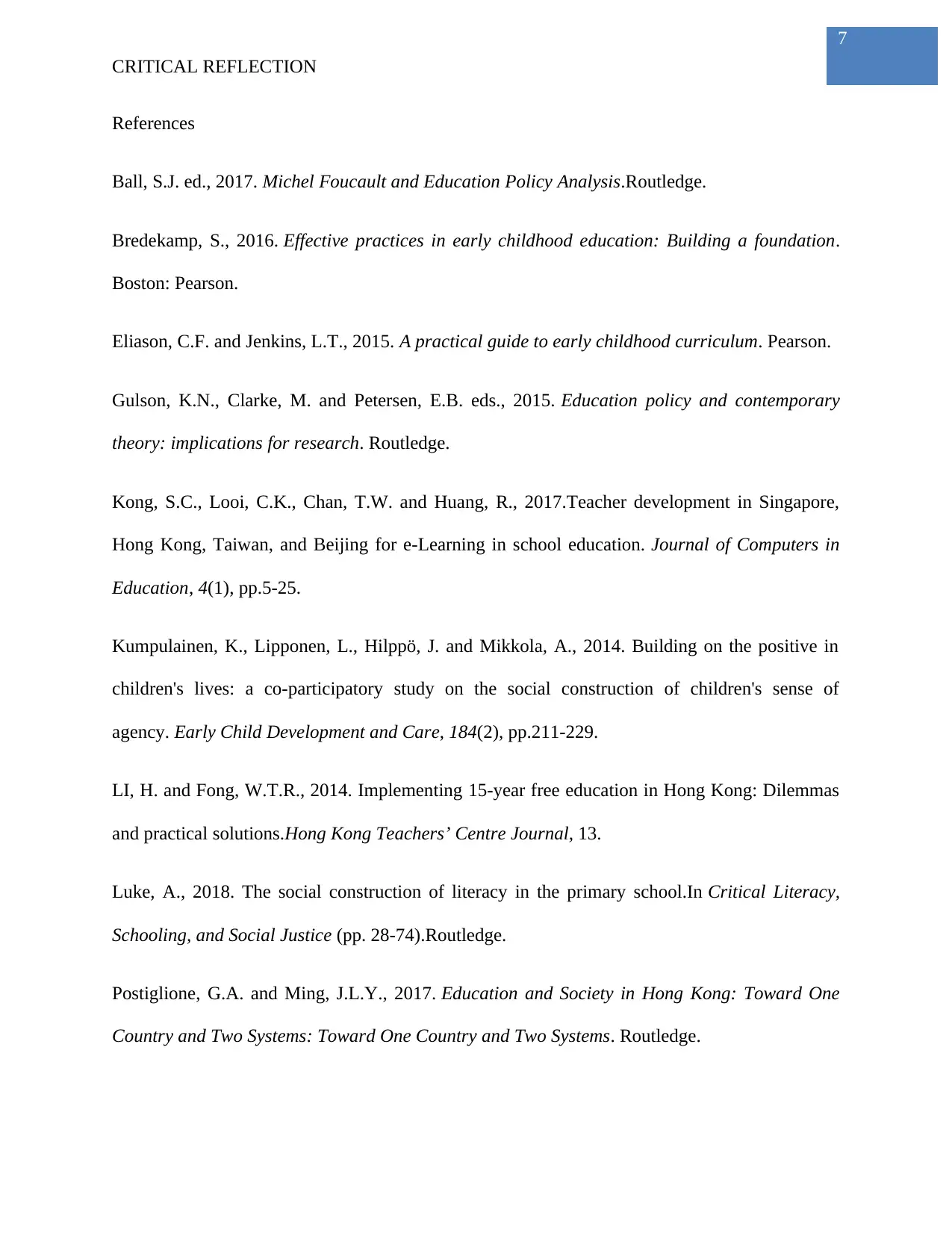
7
CRITICAL REFLECTION
References
Ball, S.J. ed., 2017. Michel Foucault and Education Policy Analysis.Routledge.
Bredekamp, S., 2016. Effective practices in early childhood education: Building a foundation.
Boston: Pearson.
Eliason, C.F. and Jenkins, L.T., 2015. A practical guide to early childhood curriculum. Pearson.
Gulson, K.N., Clarke, M. and Petersen, E.B. eds., 2015. Education policy and contemporary
theory: implications for research. Routledge.
Kong, S.C., Looi, C.K., Chan, T.W. and Huang, R., 2017.Teacher development in Singapore,
Hong Kong, Taiwan, and Beijing for e-Learning in school education. Journal of Computers in
Education, 4(1), pp.5-25.
Kumpulainen, K., Lipponen, L., Hilppö, J. and Mikkola, A., 2014. Building on the positive in
children's lives: a co-participatory study on the social construction of children's sense of
agency. Early Child Development and Care, 184(2), pp.211-229.
LI, H. and Fong, W.T.R., 2014. Implementing 15-year free education in Hong Kong: Dilemmas
and practical solutions.Hong Kong Teachers’ Centre Journal, 13.
Luke, A., 2018. The social construction of literacy in the primary school.In Critical Literacy,
Schooling, and Social Justice (pp. 28-74).Routledge.
Postiglione, G.A. and Ming, J.L.Y., 2017. Education and Society in Hong Kong: Toward One
Country and Two Systems: Toward One Country and Two Systems. Routledge.
CRITICAL REFLECTION
References
Ball, S.J. ed., 2017. Michel Foucault and Education Policy Analysis.Routledge.
Bredekamp, S., 2016. Effective practices in early childhood education: Building a foundation.
Boston: Pearson.
Eliason, C.F. and Jenkins, L.T., 2015. A practical guide to early childhood curriculum. Pearson.
Gulson, K.N., Clarke, M. and Petersen, E.B. eds., 2015. Education policy and contemporary
theory: implications for research. Routledge.
Kong, S.C., Looi, C.K., Chan, T.W. and Huang, R., 2017.Teacher development in Singapore,
Hong Kong, Taiwan, and Beijing for e-Learning in school education. Journal of Computers in
Education, 4(1), pp.5-25.
Kumpulainen, K., Lipponen, L., Hilppö, J. and Mikkola, A., 2014. Building on the positive in
children's lives: a co-participatory study on the social construction of children's sense of
agency. Early Child Development and Care, 184(2), pp.211-229.
LI, H. and Fong, W.T.R., 2014. Implementing 15-year free education in Hong Kong: Dilemmas
and practical solutions.Hong Kong Teachers’ Centre Journal, 13.
Luke, A., 2018. The social construction of literacy in the primary school.In Critical Literacy,
Schooling, and Social Justice (pp. 28-74).Routledge.
Postiglione, G.A. and Ming, J.L.Y., 2017. Education and Society in Hong Kong: Toward One
Country and Two Systems: Toward One Country and Two Systems. Routledge.
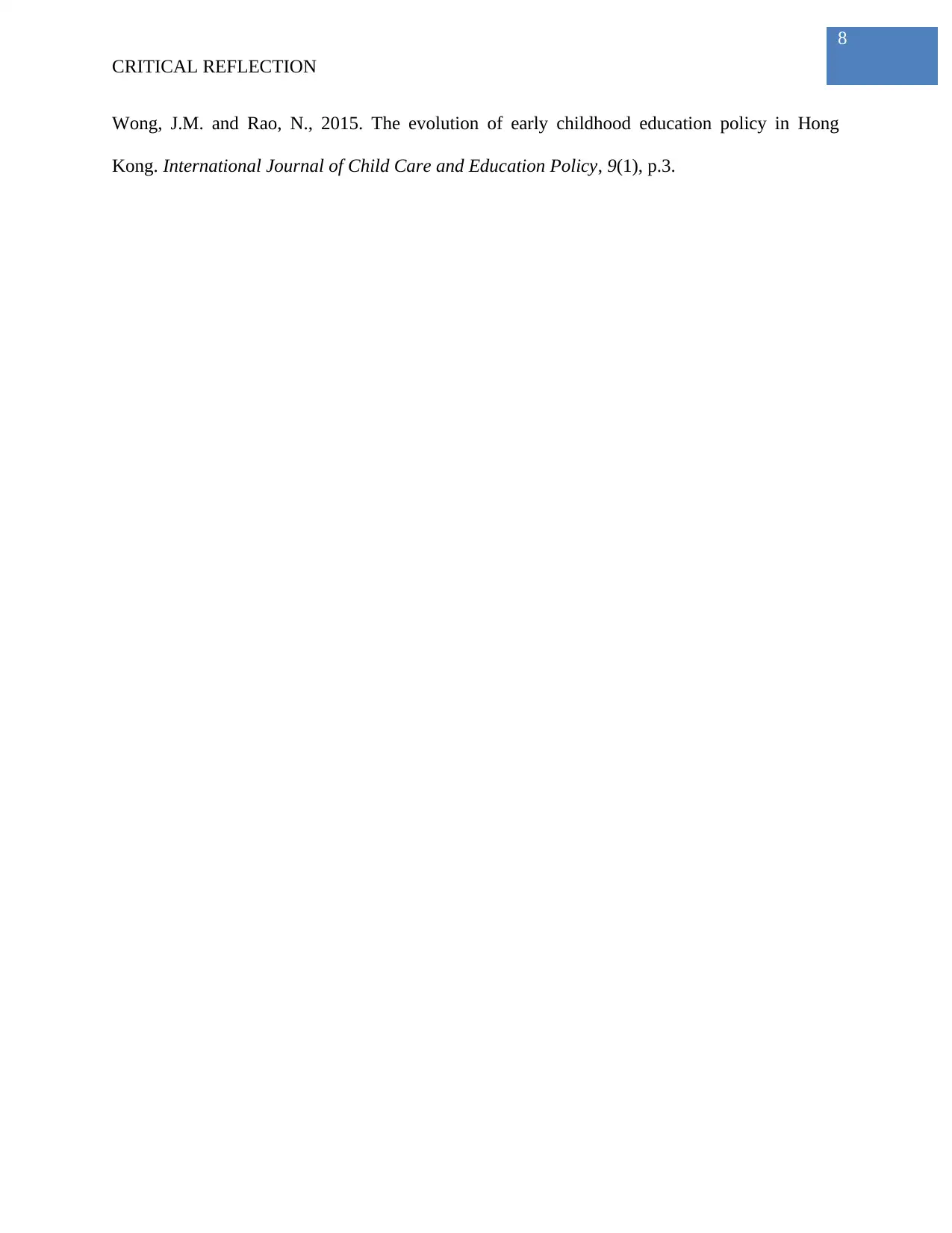
8
CRITICAL REFLECTION
Wong, J.M. and Rao, N., 2015. The evolution of early childhood education policy in Hong
Kong. International Journal of Child Care and Education Policy, 9(1), p.3.
CRITICAL REFLECTION
Wong, J.M. and Rao, N., 2015. The evolution of early childhood education policy in Hong
Kong. International Journal of Child Care and Education Policy, 9(1), p.3.
⊘ This is a preview!⊘
Do you want full access?
Subscribe today to unlock all pages.

Trusted by 1+ million students worldwide
1 out of 9
Related Documents
Your All-in-One AI-Powered Toolkit for Academic Success.
+13062052269
info@desklib.com
Available 24*7 on WhatsApp / Email
![[object Object]](/_next/static/media/star-bottom.7253800d.svg)
Unlock your academic potential
Copyright © 2020–2026 A2Z Services. All Rights Reserved. Developed and managed by ZUCOL.





